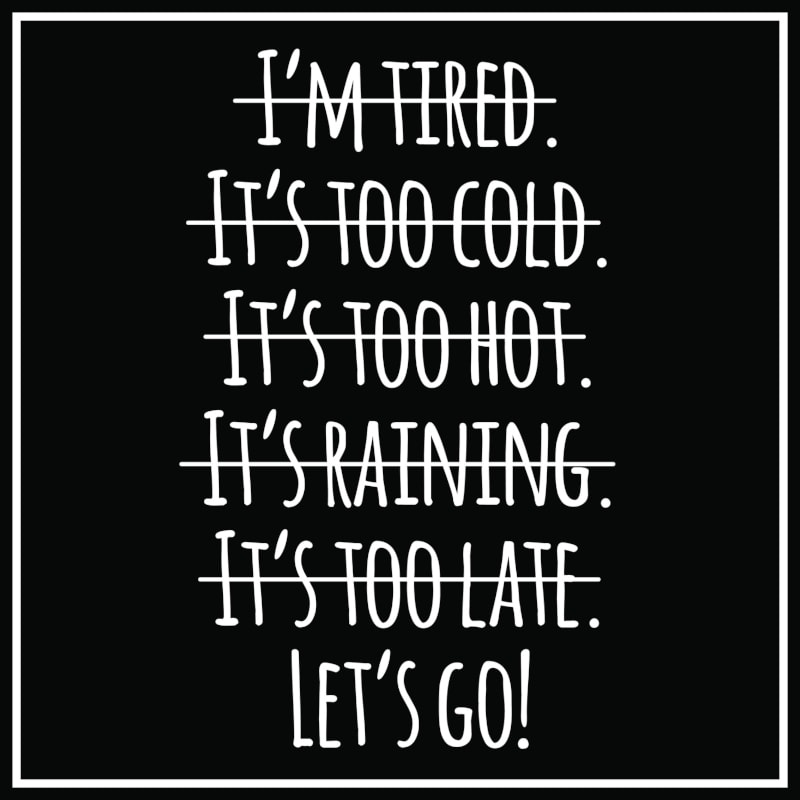
Starting and staying committed to your training can be difficult. It’s so easy to find excuses to not train. Upon closer examination, most of our excuses amount to nothing more than the skin of a reason stuffed with a lie. Other times, the excuse may, in fact, be a valid reason, but it is still not significant enough for one to skip out on your obligation to yourself concerning your health and fitness goals.
Some people complain more than others, but if we’re honest, we all voice complaints to some extent – even if it’s done silently within our minds. Not griping out loud is better than constantly voicing it, but controlling what we allow our thoughts to dwell on is a good discipline to learn. After all, our lives tend to reflect the quality of our thoughts, and negative self-talk is not helpful.
Below I have compiled a listing of some of the more common complaints people have about working out and address some ways in which you can overcome them.
Common Complaints About Exercising
During my 20 years working in the fitness industry here in the Greensboro area, I’ve heard my fair share of complaints people cite for not exercising. Some of the more common reasons individuals give for not feeling up to working out include I’m, it’s or I have /I am having a(n):
- Tired
- Hungry
- Just feeling off
- Stressed out
- Tight and stiff
- Sore
- General bad mood
- Woke up on the wrong side of the bed
- Dehydrated
- Headache
- Indigestion or gas
- Long day/night/weekend/week/month/year
- Allergy flare-up
- Hemorrhoid flare-up
- Relationship troubles
- PMS
- Bad hair day
- Good hair day, and don’t want to mess it up
- Too cold
- Rainy
- Too nice outside
- Too hot
- Hungover
- Been eating poorly
This list grows and changes as needed, but these are the most common complaints I’ve heard members voice at the gym across the years.

Steps To Take To Remain Committed to Your Workout Plan
Identifying these complaints is crucial because it makes for quicker work in the airing of grievances. Speaking of which, when working with my clients at my personal training gym in Greensboro, NC, I don’t just want to offer them fitness-related advice or platitudes. Instead, it’s my aim to give them the tools they need to take action and make changes.
When it comes to complaining and negative self-talk, here’s how we handle it at Revolution Strength & Conditioning:
- You still get to acknowledge whatever it is you are feeling. You can even say it aloud. And, if we need to, we will even write it down in order to acknowledge it.
- The agreement is that we still go on with the training. Sometimes the complaints may result in altering our training plans for the day if it’s a smart decision to do so, but we are going to train to whatever extent we can that day.
The complaints will be duly noted, and then we carry on with the workout. Usually, I find that my clients’ moods improve soon into the training session, and ultimately by the end of the hour, the troubles seem smaller and the complaints forgotten about.
The main takeaway or lesson learned from all this is that acknowledging our feelings is important, but we do not allow feelings to control our minds and our actions. We show up and train not because we feel like it– rather because it is time. We don’t do what we feel like – we do what is necessary. All these decisions are driven by our predetermined goals.
How To Convert Your List of Exercise Complaints and Step Up Your Fitness
If you find yourself constantly making excuses for not working out, I’d recommend using the list of complaints above to build your own unique list of ones you consistently use. You’ll soon develop the habit of recognizing your complaints as largely invalid to what you need to do that day. In time, you may even arrive at the place without even needing to acknowledge them.
When you stop feeding something, it will be unable to grow. In place of the habit of complaining about what you do not want to do, you will instead begin to implement the habit of focusing on what you are going to do. A strong body is not built without simultaneously strengthening the mind, and this is an effective tool to use toward that end. Perhaps the greatest benefit to all of this is the carryover to the rest of your life outside the gym. Ready to work on your fitness goals together? Reach out for more information.



I did this with my previous coach. It was amazing to acknowledge and even joke about the complaints!!! After acknowledging the complaints and laughing about them, it was definitely easier to get on with the business of training